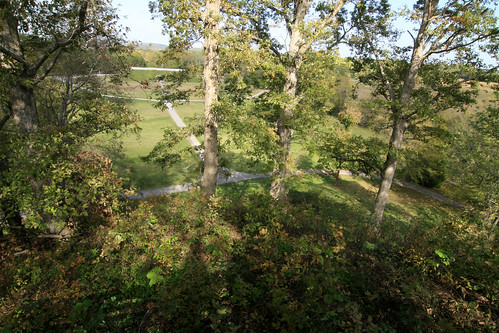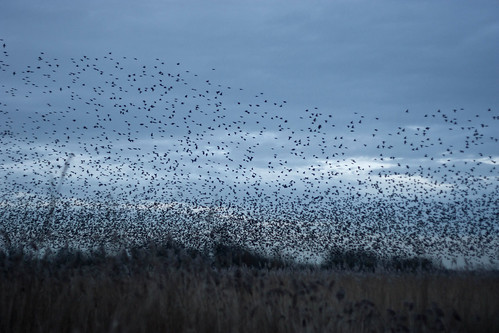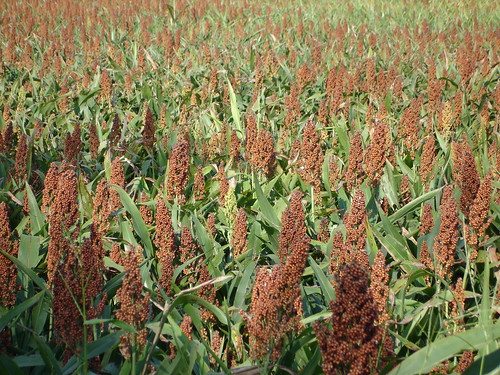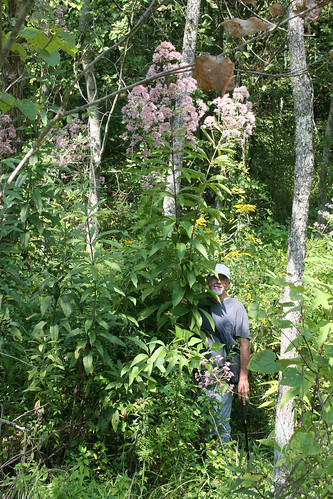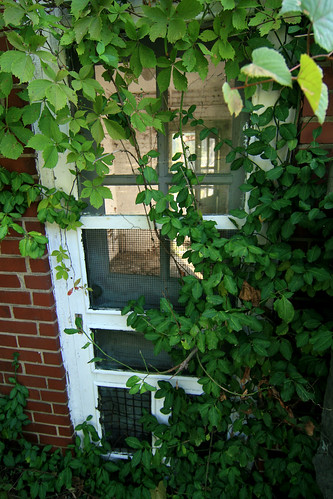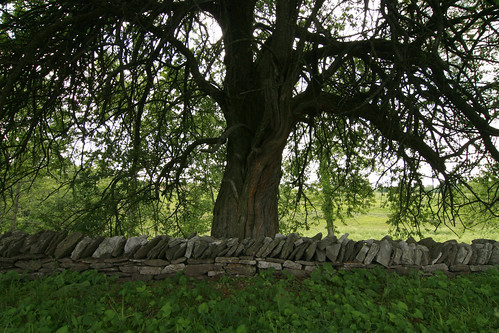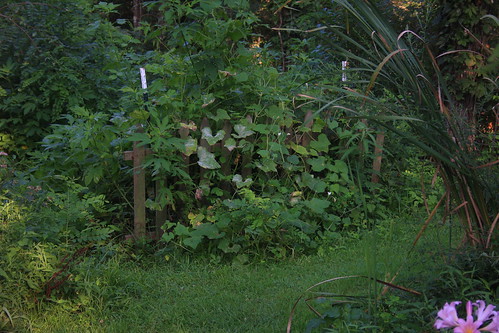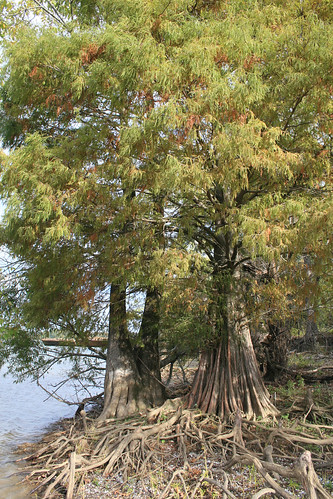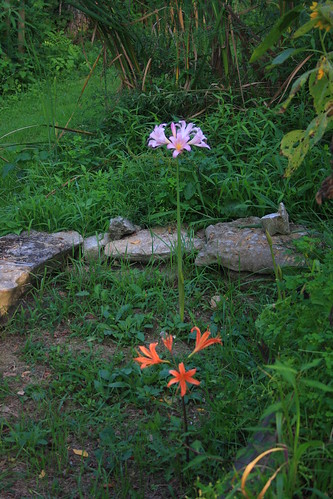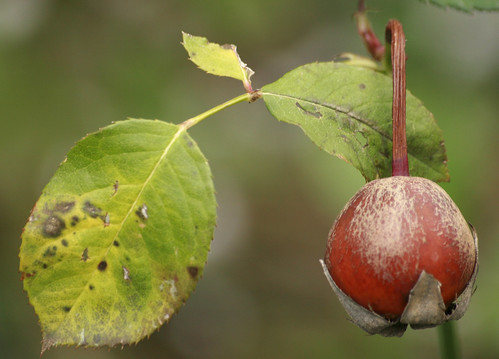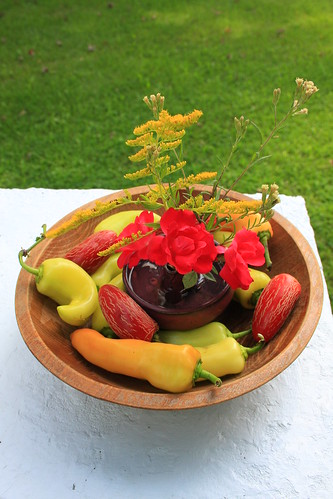|
| 2016 | JAN | FEB | MAR | APR | MAY | JUNE | JULY | AUG | SEP | OCT | NOV | DEC |
| 2017 | JAN | FEB | MAR | APR | MAY | JUNE | JULY | AUG | SEP | OCT | NOV | DEC |
| 2018 | JAN | FEB | MAR | APR | MAY | JUNE | JULY | AUG | SEP | OCT | NOV | DEC |
| 2019 | JAN | FEB | MAR | APR | MAY | JUNE | JULY | AUG | SEP | OCT | NOV | DEC |
| 2020 | JAN | FEB | MAR | APR | MAY | JUNE | JULY | AUG | SEP | OCT | NOV | DEC |
| 2021 | JAN | FEB | MAR | APR | MAY | JUNE | JULY | AUG | SEP | OCT | NOV | DEC |
| 2022 | JAN | FEB | MAR | APR | MAY | JUNE | JULY | AUG | SEP | OCT | NOV | DEC |
| 2023 | JAN | FEB | MAR | APR | MAY | JUNE | JULY | AUG | SEP | OCT | NOV | DEC |
| 2024 | JAN | FEB | MAR | APR | MAY | JUNE | JULY | AUG | SEP | OCT | NOV | DEC |
![]() Read current month's Daily Reflections
Read current month's Daily Reflections
![]() Table of Contents: Daily Reflections
Table of Contents: Daily Reflections
![]() Youtube Channel: Video Listing
Youtube Channel: Video Listing

Late Purple Aster, Aster patens
(*photo credit)
September Reflections, 2024
September's song rings in the late summer season when fields await the harvester, time is urgent, laborers are few, and work requires cooperative effort. It is the extended Pentecost season when our relations with communities become the focus of our attention. Here we ask: How are communities changing and can we start talking about alternative Systems? Will these communities encourage collaborative efforts on the part of all people of good will? Are we inspired to perform essential saving deeds as part of proclaiming the Good News? Can we take time to celebrate and pause, even though the tasks ahead are most pressing? Can we find God-for-us who encourages us to share with others in the way God shares with us?
Asters Some of us are run-of-the-mill, |

Dawn of a new month.
(*photo credit)
September 1, 2024 Exploring Community Enhancement
We need community, for isolation paralyzes us. Community is experienced at a variety of levels: We can speak of the cosmic community comprising the interrelationships with all creation to our bioregional communities embracing more proximate plants and animals. WE include the human communities, both local in scope and intentional, social and professional, bioregional and global. In fact, without some textual clues, many are frustrated by people overusing the word "we," and perhaps rightly so. But on second thought, don't we deliberately incorporate a grand vision when we use the term and expect the utterance to have a broadening effect?
To travel alone is one thing; to travel with companions is always an added challenge -- and blessing, with powerful side effects. We are becoming aware that God, the Author of all community, invites us in a special way to embrace and work with equipment at hand, namely, a sacramental Church united (one), committed in its spiritual grounding (holy), worldwide in its scope (universal), and conscious of being part of salvation history (apostolic). At Cornelius' house St. Peter, as head of the Church, hears the message to go out to the Gentile world (Acts 10). We need divine direction here and now, for we are called to help save a troubled world. Earthhealing as an urgent mission must be a united, committed, universal, and historically conscious movement.
Liturgical action is the celebration of the work of the people, a work recognized for its inherent value. We do more than work together like ants in a colony; we are self aware of goals lying ahead and realize the power of self awareness. Furthermore, as human beings we celebrate by consuming the Bread of Eternal Life, Christ himself, to help us achieve our goals. Only a deep and abiding communion with God and with each other allows us to reach to Infinity, for our time, space, and social lives are satisfied in collaborative work. We are challenged to express ourselves in community with sure faith that we also grow individually by doing so. We know that part of the challenge is to transfer individual enthusiasm into community excitement. The Spirit of truth and love impels us to break away from ourselves and go out totally to others -- and the more we give of ourselves in service, the more we are impelled to share with Earth herself.
Communal action is needed not just to enhance or beautify the Earth but also to save it from destructive individual selfishness, the sign of Capitalism amid its libertarian decadence. An authentic eco-spirituality cannot tolerate the power that stems from uncontrolled greed as a legalized System. As a community, we must recognize the power of inspiration, enthusiasm, and the God within; our time, space, and harmonized work are transformed into communal service for the common good. Thus, we enter more deeply into the actions of our Triune God. We discover the power of humble service, a delving into Mystery through collaboration.
Confronting the Dangers of Gross Inequality
By Fr. Al Fritsch, SJ
Talents differ among people, and by any set of measurements some folks are more or less talented (in sports, academics, etc.) than others. Inequality exists under various ways of viewing achievement and success and this is not disputed. However, when it comes to economic resources, lack of controls on accumulation and retention of wealth can lead to immense disparities and can impinge on the rights of the poor for basic necessities such as sufficient food, clean water, fresh air, proper lodging, adequate education and health access.
Inequality fails to address insecurity. Some resources are plentiful for those who can afford them, but scarce for those who lack financial means to acquire them. Cruel insecurity exists in our world though poverty conditions have been reduced in recent years, especially in China and other developing nations. However, in parts of Africa and the Middle East there are notable examples of famine, civil strife, and other reasons of maldistribution of goods. In such dire inequality on a global level enormous concentrations of wealth that can be applied for such areas of distress cannot be tolerated. Yes, resource inequality can certainly be a form of terrorism to victims; it haunts a family when the breadwinner is unable to provide for the welfare of his or her dependents. Furthermore, through technical development the arena of basic needs (especially in health accessibility) continues to expand -- and this requires still more economic resources to address expanding health and welfare needs.
Inequality hinders radical sharing. Proponents of the status quo will be quick to say that particular wealthy individuals are willing to part with some (hardly ever all) of their resources to benefit others. Is this true charity or protection of their privilege to retain fortunes? Many of us have a deep religious conviction that Earth's resources are to be shared by all. However, with half of such resources controlled by a privileged 1%, that is simply not the case; here approaches clash. For some of us, the charitable thing to do is to assist the needy in obtaining their fundamental right to resources and to do so through the most efficacious means possible without recourse to violence. Sharing is healthy and radical sharing of all resources is challenging.
Inequality borders on the inhuman. Many primitive people living in small groups more fully understand how to be human than sophisticated people with advanced stages of capitalism. To fail to be able to acquire basics of life becomes immensely depressing, and it takes little to go from scarcity to a full blown awareness that winning lotteries are only for a few and most will never reach the 1% privileged class. In a world of unlimited resources one could perhaps tolerate the privilege of wealth, but that is not the situation for the near future.
Inequality breeds cutthroat competition. Views differ as to whether competition is good or not. Some would hold a middle ground that competition is acceptable if it stimulates better creative use of limited resources. If limited resources are held with the support of physical force or non-violent citizens, then to play by the rules of the status quo is the expected practice. The myth spreads that working harder is supposed to yield rewards of a higher standard of living. Higher costs, especially in education and health, will dampen the pure motive of competing with others, for responsibilities differ with the condition and talents of individuals. In our no frills world some might succeed and others fall by the wayside. Circumstances turn brutal and resemble dogs fighting for dominance over prey. A sense of community trust soon erodes if the beauty of sharing is replaced by cut-throat behavior.
Inequality triggers general discontent. As the superrich enhance their hoard in multiples of billions of dollars, the have-nots become more disgruntled for some of the excess resources that are misspent and wasted. They may envy what others have or simply want their fair share. If modern un- or under-employed youth refuse to accept a condition of postponed marriage or failure to use academic resources usefully, they will be disheartened and angry -- and rightly so. Their numbers grow into the millions. Through access to social media a better world appears out there and discontent simmers; their needs and wants coalesce.
Inequality leads to growing indebtedness. Astoundingly, the national debt grows as the concentration of wealth increases. This seems to be counter-intuitive until we consider the human greed factor. Materialism by its very nature never satisfies those acquiring more, and so the wealthy are driven by an addictive impulse to capture more of the limited pot now and postpone to others after their passing to pay the bills to society. Greed means taking still more from those with less power to resist, even if they be the unborn future generations. Not repaying for the resources captured or used wastefully leads to a global debt that becomes harder to pay with time. Due to the power of the wealthy the tolerance of such debts is permitted and the inequality is continued for decades. Responsibility is overlooked. One-quarter of our wealthy corporations (some quite profitable) pay no taxes at this time. Bills rise and tax receipts become more limited.
Inequality is immoral. This is the hardest sub-issue to tackle because most Americans do not think it is wrong to be wealthy, but rather a puritanical virtue that is legal -- even though the legality was acquired by the influence of the wealthy. For them, acquiring wealth is a blessing and sign that God gives them special favors due to righteousness. That others lack the necessities of life is either denied or regarded as something beyond an individual mandate or concern. The Gospels warning not to overlook the poor is not regarded as applicable in the life of the selfish wealthy folks -- and is condemned outright; thus the Scriptural warning that to amass wealth is not proper for the true believer.
September 2, 2024 Attending to Joyful Valleys
This is how you provide it;
by drenching its furrows, by leveling its ridges,
by softening it with showers,
by blessing the first-fruits.
You crown the year with your beauty,
abundance flows wherever you pass;
the desert pastures overflow,
the hillsides are wrapped with joy,
the meadows are dressed in flocks,
the valleys are clothed in wheat,
what shouts of joy, what singing! (Psalm 65:10-13)
September is refreshing after the heat of July and August. Now change is in the air. Vacation is ended; it's time to get back to business, whether in school or everyday activities. In September, the landscape proclaims plenty, especially in the freshness of morning or immediately after a late summer rain. Gold and purple are the colors of the month, as crops ripen and the pastures and road sides are punctuated with goldenrod, ironweed, and asters. Mist envelops the valleys and ascends to the uplands, and as it fades with the strengthening sun, we observe stark September beauty in all its majesty. There's oneness with an inviting Earth, even while troubles linger right below the surface. We would like to grasp and make permanent scenes that pass before our eyes, but these are so fleeting, so seasonal.
Sights of valleys and other land forms give us joy; sounds of birds awaken our senses to the changing seasons; scents of the plant world enliven us; working with other people gives us the sweet taste of communal achievement; and in moments of utter exhilaration we express this feeling of togetherness through celebration and dance. At harvest season we become more aware of all experiences of God's creation; we strengthen our bonding and the ability to work together and to sustain our collective enthusiasm, that is, awareness of God's presence among us.
The valley's mist is the true foreshadowing of the season's change. Warm air cools and moisture condenses, and the differentials seem more pronounced in this season. The mist hangs like the heavens dipping down over the valleys to give a special blessing for the abundance contained therein; even this is a temporary expression that vanishes by mid-day. The early morning view on high ground is awesome though changing -- and that adds to our atmosphere of wonder. Do we need to be totally immersed and yet, if so, do we miss the panorama? Community involves an inherent ambivalence, for we restlessly seek stability and yet something more -- and neither is possible right now.
September 3, 2024 Noticing Autumn's First Signs: Flocking Birds
Like a bird flying through the air --
leaving no proof of its passing;
it whips the light air with the stroke of its pinions,
tears it apart in its whirring rush,
drives its way onward with sweeping wings,
and afterwards no sign is seen of its passage.
(Wisdom 5:11)
Birds are our companions and we strive to have a symbiotic relationship. In some ways they seem close while still holding a distance. I marvel how much birds feel at home with our human artifacts such as feeders, nesting places, watering holes, and wiring for perches on which to sing. Our mockingbirds like the highest perch, whether manmade or not, and there command the countryside. In spring the woodpecker uses the gutter to make a resounding racket. Birds use our artifacts rent-free, but reciprocate by giving us pure delight, something well worth a partnership that we hope will continue to thrive.
What if the flocking ceases and the birds disappear from our scene? Perish the thought! How could our world be birdless, for they have been with us so long -- sparrows, thrushes, doves, crows, buzzards, cranes, geese, cardinals, bluejays, hummingbirds, and on and on? They make our landscape; they beautify scenes by their flashing feathers; they lighten our day with song; they help define our quality of life and show us how to trust and be care-free. A birdless world would be a disaster, something we can ill afford; without them we too would lose much, namely our sharing power as humans. Let's keep it from happening.
Flocking Birds
I go out and hear them congregating
all speaking at the same time -- winter comes
maybe so, maybe so.
How am I to interrupt their animated chatter?
They fly within the leafed tree in a flutter;
just as abruptly they depart for another place;
Is it the stress of impending seasonal change,
or induced excitement of sheer number.
When they pass over in such number,
I shield my eyes for fear
their dropping might miss the good Earth
and hit me right between my eyes.
September 4, 2024 Recalling the Smell of Silage
The house was full of the scent of the ointment. (John 12:3)
Some who are unfamiliar with silage would say the smell emanating from the silo is too harsh to their senses. Yes, it is an alcoholic smell starting to turn sour, but with a freshness of chopped vegetation. Actually for rural-rooted folks, the odor of silage brings back a flood of memories: the cool green chopped corn and cane filling the silo in late summer, the slight fermenting odor of the stored material in the autumn, and the way the cows would jostle each other to get to the silage in the winter feeding troughs. All blend together to give us a sense of community with the relishing bovine herd.
Scents are often better than sights and sounds in recalling us to past experiences, whether good or bad. Often the pleasant fragrance reminds us of those with whom we shared good times, even if the place was a lowly barn where we fed hungry animals and shared in ordinary contentment. That enjoyment persists through the years and includes people and homes, incense-laden churches, old-fashioned drug stores, and restaurants with distinctive aromas. A world of spices tell us of happy times and places of the past. Those abiding smells are sacred to us and can be shared by others, or simply retained in the recesses of our individual memories.
Maybe September is the time to share our moments of stories of contentment with others who are unfamiliar with the particular environment. Let's spread our individual enthusiasm to the wider community, even when some have not shared certain experiences with us in the past. Our enthusiasm becomes theirs as well, and thus scents can be the cement of community formation; these aromas become the triggers that make our mouths water and our tongues loosen to include praises for God-given sensations.
Scents of September
Smell the tip of a cantaloupe to see whether it's
ripe enough to eat;
Be drawn to the ripening pear tree
with fallen fruit surrounded by yellow-jackets;
Stoop and draw in the faint scent of the autumn
flowers of yellow and gold;
Sneeze to the distant air of rag weeds
at road side or in pasturelands;
Wheeze amid pollen-laden woodlands
from all undetected sources; and
Mingle them all with a sweaty dog
that only wants a single encouraging pat.
September 5, 2024 Tasting "Joy-Foam" at Sorghum Time
Take it and eat it; it will turn your stomach sour,
but in your mouth it will taste as sweet as honey.
(Revelations 10:9b)
Rural kids, like folks all over the world, love sweets, and all tend to indulge too heavily. Besides honey and maple syrup, the sweetening agent of choice in this region has been derived from sorghum cane. Yes, sorghum-making is hard work and takes real expertise -- all to capture and store the perfect sorghum taste. In the autumn the cane is cut, brought to a sorghum mill, stripped of leaves, and then ground by a crusher or mill, powered either by a horse or mule or by a gasoline- or electric-powered mechanical device. The pulp is squeezed, collected, and boiled down in a long trough. The expert master sorghum maker is leader of the operation and calls for more cane or wood for the fire, or requests that others get out of his way as he skims the boiling river of clear amber syrup, a demanding finished product to be treasured.
While the sorghum master runs the operation, kids scamper about and dip cane sticks or spoons into the thickening sugary stream to partake of the pleasure of "joy-foam." And they have to know just how much is okay, for too much will spoil appetites or turn stomachs. It is all part of learning to limit one's appetite for good things. Life craves its sweetening agents, provided the tempted ones know when to stop. All good things are of value, but only so much of them is meant to be tasted, not overly indulged. Part of a community's working together is cautioning and assisting individuals to reach and know their limits, to enjoy when partaking, and being satisfied when having enough. Some but not all say, "it's only a taste that makes the season."
Often a taste binds us to a region or a special event. We acquire tastes, for in youth we sometimes wince at new and strange flavors; it takes getting used to for us to begin to like certain foods. That is because tastes come with other attachments, including texture or special conversation or shared enjoyment with others who we love and have special relationships. Tastes then become part of extensive connections all contributing to something enjoyable. We can cultivate new tastes and realize how much the culture of tastes enters into festivals and feasts. Thus, to come to appreciate another's taste with them is a gathering of sort that brings on further enjoyment, cementing us with extended brothers and sisters throughout the world. We may even have to accept the challenge of recognizing why we do not accept the taste of stinky cheese or tropical fruit that others relish -- and learn to smile and accept them as part of collective fun that makes us friends who come from different backgrounds.
September 6, 2024 Learning the Art of Healing
Then the eyes of the blind shall be opened,
the ears of the deaf unsealed,
then the lame shall leap like a deer
and the tongues of the dumb sing for joy;
(Isaiah 35:5-6)
Isaiah tells us that God's redemptive act for the exiled people of Israel is through the wonderful signs of healing. These people are discouraged and need the powerful presence of God for encouragement and comfort -- and a merciful God is more than willing to respond. The eyes of the blind are opened.
In our second reading (James 2:1-5), we find that we are not to show favoritism, but to look out in a more universal fashion to a general field calling for healing; this requires motivation. As genuine healers we must determine where the need is greatest, as Pope Francis described Church as a triage station on a battle field. Insensitivity and favoritism makes healing quite skewed in this age of rich and poor, of affordable and costly health care.
In today's Gospel passage (Mark 7:31-37), Jesus reveals a spiritual power to overcome a deaf person's handicap. Jesus shows compassion in a personal way -- touching the ears, making spittle for application to the tongue, and looking upward in prayer. The individual responds in faith, but the others in the audience only respond in wonder, thus expressing only a partial understanding. Jesus opens the way for deeper spiritual transformation through forgiveness of sin and coming to faith. Healing continues through the Church's ministers in anointing the Sick and forgiving sinners. Furthermore, the secular enterprise of health care becomes part of that extended global action that includes Earthhealing.
Jesus healed a leper who was so overcome that he broadcasted the feat throughout the region. As a result, Jesus could not continue his ministry there. The same thing happens again in this incident. We need to heal profoundly or, otherwise, we will merely see Jesus' miracles as wonders and miss the deeper spiritual message. Our healing on whatever occasion is the beginning of a making of the Kingdom of which this one incidence has a deeper and lasting meaning. Healing is a portion of a turning, a revolution.
Healing at an individual level announces a major change: praise God as Source of all healing; see Church as an instrument of healing; and practice healing without partiality and through proper discernment. All are entitled to healing. We do this through sacramental healing, prayer for the healing of others, caregiving in charitable institutions, improving quality of life among all people, support of healing procedures and scientific research, and through our being called collaboratively to heal a wounded Earth.
September 7, 2024 Dancing the Virginia Reel
Why skip like rams, you mountains,
why like lambs, you hills? (Psalm 114:6)
Dancing seems to come naturally to so many, for we enjoy touching and communing with our vibrating Earth. Watch a child upon the arrival of a loved one; it's a dance. People naturally express themselves at festivals and happy occasions with dances of wide variety. It is total emotion of body and soul manifested in the rhythmic movement of all parts with each other. I once enjoyed the Virginia Reel -- joint rhythm amid Scottish order.
Humans dance with joy. Being at the height of human expression of joy, we honor sacred dance whether by individuals or groups in coordination. How could some severe people discourage dancing in the name of religion, when the Scriptures are filled with this expression of joy? Didn't David dance and sing? Were not the people returning to Jerusalem expressing their feelings through sacred dance? And aren't the Scriptures replete with social life? Don't the psalms say that those seemingly lifeless mountains and hills express joy through movement, or at least vibrate so subtly that we often fail to feel it? Don't birds sing and colts scamper about? Are we too leaden-footed, stone-deaf, and hard-hearted to experience other creatures when they celebrate?
Our Earth dances. Looked at from a distance Earth rotates, wobbles, and is alive with internal vibration that is occasionally punctuated with a dramatic earthquake. Earth herself has a vibrational rhythm that dancers can enter into, patterns that others unfortunately fail to detect. The sounds of the universe vibrate in uniformity with those who live harmonious lives; their bodies are in tune with a heightened spirit of motion and they learn to dance with the planet's vibrations.
It's dancing time. With all the plenty God gives us during each growing season, the time of harvest is good for dancing. And expressing these feelings of joy is giving praise to God for giving such bounty. We can remain glum for many reasons; but there are a multitude of grander reasons why we ought to be happy and to skip about like the hills and colts on certain occasions. The waning of summer may be the perfect time to reel about this September.
God dances. Most of all the reason we humans like to dance is because God likes to dance, and we are made to God's image. We picture the Trinity as a dance so intense that all is blurred into a single image, and the oneness stands out. The relationship between Father and Son and the bond of love between them is expressed as a dance -- perichoresis in the Greek -- a fast-moving dance on a mere human level, so rapid that the individual dancers blur before our eyes as they whirl energetically about in and out.
September 8, 2024 Celebrating in a Total Community
We believe in one, holy, catholic, and apostolic church. Nicene Creed
Often during celebration of the Divine Liturgy the thought comes that this is a profound transformation taking place; here we offer with Christ one grand sacrifice, in union with all people of good will, and with all creation. It's a universal celebration.
It's Mary's birthday and a worthy time to celebrate, but we balance this with the recognition that our Earth is in trouble. Can we do the two simultaneously? We strive to celebrate and engage in serious work at the same time, for that is what it means to be "Church." For believers, Church is a resource for meeting essential needs through a mission of salvation, structure, worldwide network, and commitment to justice. Through both work and celebration we mobilize our powers as healers. And who are to be mobilized? Not just the concerned or the elite, but what Vatican II terms the "People of God" (all leading good lives, loving their neighbors, and awaiting a meaningful future). For such change to occur let's start with being leaven in the dough, those with a sense of divine mission for the task ahead.
For believers, the Church is the divine instrument of effective work, the means to salvation and yet more than the personal means -- the means of saving our Earth from the ravages that tend to engulf us. This instrument is a public institution for all to see and join, not an exotic and secretive movement of a few, but plainly visible in its striving for oneness, holiness, continuity in time, and universal presence. For the Church, assisting in healing is not a pen for corralling, but rather a launching pad that is able to be experienced as part of the Almighty's plan for a New Heaven and New Earth.
Believers experience the coming together as ongoing Pentecost, a sense of community that is "Church," the liturgical celebration (work of the people), which encourages and enhances that union; she is the glue and binding that hold this communion together, and the realization that this is participation in the life of the Triune God. Why talk about celebration when such turmoil exists? It is human to take breaks even in serious work, and to know that ultimate victory is in store. As followers, we imitate the manner in which Jesus lived, died, and rose. He undergoes threats and yet attends and celebrates in banquets and feasts; it is different from that of cousin John the Baptist. Sacrifice is part of our duties, but so are celebrations, for we are Easter people. We join with others in work and in play at the altar of our Earth.
Let us examine our communal efforts: as part of various communities; as part of the promised community launched at the first Pentecost; as the liturgical celebration of the work we are undertaking; and in the Triune image in which we are created.
Overdosing in Appalachia and Beyond
By Fr. Al Fritsch, SJ
Official reports tell us that 107,941 drug overdose deaths occurred in the U.S. in 2022, and topped 112,000 in a 12 month period for the first time last year. I don't believe the accuracy of these frightening stats; they are most likely under-reported. A decade ago I rode in the hearse carrying a parishioner to the cemetery (which was within the KY Natural Bridge State Park); on that weekend afternoon the undertaker mentioned that this was the seventh funeral that week and only one NOT a drug overdose. My efforts to verify the epidemic's intensity were stonewalled by funeral directors' reluctance to reveal real death causes, due to insurance hurdles. Was this problem national?
Too often public attention has been on our central Appalachian counties. One of the two countries (Powell and Estill) serving as my parishes is third among Kentucky's 120 counties in per capita overdose deaths. Furthermore, these two counties are among only ten in the nation's over 3,000 that experienced a decline in life expectancy since 1983, though most recent surveys suggest a wholesale national decline caused by increased suicides and overdoses. I've been hesitant to discuss overdosing due to an inability to influence the local situation, much less a broader one.
Once a suffering homemaker told me "Father, on the couch where you are sitting my daughter died of an overdose -- and her loss constantly pains me." What struck me then and now is that the pain afflicted on such humble folks losing young and promising loved ones is many times greater than the pain relief of the opioid prescription medicines that were the starting point of over half of the current drug addictions. And Americans take 80% of the world's opioids, which after subsequent addiction will not be pain killers but killers inflicting pain to survivors. Yes, a real problem!
Pharmaceutical propaganda to physicians and caregivers is laden with the message 'more drugs are better.' Regrettably, some in leadership roles in our nation prefer to blame victims and, beyond the simplistic "just say no" solution, dare to speak of greater access to medications that help fight the addiction. For them, questions subtly shifted from "why take a medicine?" to "which medicine must I take?" We have become a drugged culture that is driven by a combination of corporate greed, permissiveness and human weakness. But the power of the first mentioned must not be overlooked, for these companies have hooked at least two million on their products and then regard victims as engaged in criminal activity. Lest we forget, the majority of folks become hooked on legal opioids and then on fentanyl and even stronger chemicals, all starting with legal prescription drugs. Stats on the full extent of the problem may be beyond one hundred thousand per year.
Is this a uniquely American problem, not just an Appalachian one? Certainly the blame is to be distributed, but let's not overlook social and economic conditions as well as individual hopelessness and illness. Why does our country allow the advertizing of medicines? Why does it allow exorbitant profits to drug companies, especially when much medicinal research has been government-funded in the first place? Why talk so much about opioid pain killers when these become killers inflicting many times more pain on victims' families?
Consoling victims and their loved ones is hard enough as a pastoral duty; to conceive of ways to stop the epidemic in a meaningful manner by working in the public interest is far more difficult. Our citizenry must collaborate creatively to stop the marketing and distribution of opioids and to encourage litigation by victims and families to discourage the "legal" production of these substances. To silence skeptics, though I do take some prescribed medicines I have no painkillers in my residence, even the little aspirins my physician urges me to take. But, on the other hand, I do not suffer from chronic pain and may act differently if not blessed with good health. Neighbors suffering from cancer tell me they dare not publicize their condition for fear of thieves breaking in to steal painkillers.
Certainly, there's no magic solution, for the problem is complex. Non-medicinal ways to manage pain exist and the literature is readily available to those who choose to abandon the highly expensive medicinal route. It is more than just offering it up, and yet one doesn't need to risk becoming addicted by overlooking other safer and more natural means. Regionally, we do emphasize better employment opportunities, accessible health care, and praying with and for our people. However, a national emergency declaration is helpful: stop opioids as prescription drugs; stop advertizing drugs on TV; stop allowing exorbitant drug profits; and stop pretending that the problem is localized.
On the other hand let's start working together and go beyond casting blame: let's be willing to work on a person-to-person level; let's acknowledge that even the non-addicted take too many drugs; let's start regarding Federal drug research leading to end products as the "commons," to be distributed at a federally-mandated lowest price possible; let's start thinking of people first, not profits; and let's start training caregivers in non-medicinal approaches to palliative care. Accepting that we have a national drug problem redistributes the onus to all of us and not just to a few of us working at places with acknowledged high addiction rates. There's no easy fix, but attempting a variety of solutions at the same time may prove advantageous to all. Let's work together to help overcome drug addiction.
September 9, 2024 Embracing Cosmic Community
You must all think of what is best for each other and for the community. (I Thessalonians 5: 15b)
I learned about community at an early age, as much from the plants and animals as from human beings. Perhaps I could have been more social as a youngster, or even now, but I do experience community on many levels, and maybe that is how one can be even more community-conscious, rather than being simply a people-person.
The sense of "community" goes way back in time, but reflecting on it systematically has a more recent history. We speak of community improvement, development, awareness, community-building, formation, appreciation, organizing, and community studies. Writers even talk about the concept of community as something that is paramount in our universe (Reference: Jane Blewett, "Community at the Heart of the Universe," The Ecozoic Reader, Autumn, 2000). Our efforts at Earthhealing demand an understanding of community in all its varied forms. Communities abound: molecules are "communities" of atoms; flora cluster together and mutually support each other; fauna gather in communal life -- clusters, pods, flocks, herds, dens, colonies, hives, swarms, packs, and schools, and on and on. Elementary and even complex forms of socializing emerge in termite and ant hills. Cooperating species in biological associations and regions (biosystems) -- communities of communities that are interdependent on each other.
Our local community has been for many people and millennia the center of our universe -- though for the past few centuries it has a humble place in the solar system, galaxy, and total universe. The Gaia Hypothesis of Earth as a living being with sensate properties is quite popular, has some scientific basis, and certainly lends itself to poetic license. We are compassionate and form community with Earth herself, a unique living cosmic body. Her life-forming mechanisms, her mantel of oxygen/nitrogen and lively waters that cover four-fifths of her surface -- all proclaim vitality and singularity. This living mother Earth shares with her creatures in her origin, existence, salvation, and destiny, -- and in community life itself.
Humbly, we discover an evolutionary order of things with elementary communities existing before humans came on the scene; we speak of our community with -- Earth, plants, animals, and other human beings. With rare exceptions, human beings are community dwellers, and we cluster in ever expanding aggregates for purposes of mutual security and for enjoying civilized life. We all share a certain restlessness and desire for stability. We have a deep craving for social bonding, not individual dog-eat-dog competition. It takes two to make a pair and three or more to make a community. Friction arises, as do feuds and wars, and yet we seek the glue of loving nurturing relationships to bring and keep us together.
September 10, 2024 Considering Church as Community
The kingdom of heaven is like a mustard seed that a person took and sowed in a field. It is the smallest seed of all the seeds, yet when full grown it is the largest of plants. It becomes a large bush and then birds of the sky come and dwell in its branches. (Matthew 13:31-32)
Mustard seeds are certainly small, but not absolutely the smallest seeds. Once a normally small mustard plant in our solar greenhouse grew to the twelve-foot high ceiling. No other greenhouse plant came close. Maybe mustard can grow way beyond our own imagining, which is what the faith community is to do as well.
Strife calls out for communities that have some unity of purpose, a common commitment in spirit, and a memory of past successes in working together. Ultimately, our community is from God, the creator of all. The Spirit hovers over the waters; the Wisdom of God speaks in space and time. The universe moves from oneness, and back to God Who is one. And somehow in some mysterious way we are brought into the divine communal action. Let us make man in our own image (Genesis 1:26). Earth has dignity as the very pulsating substrate of a New Creation, redeemed in Christ's blood, and re-created through the power of the Spirit. Let's look into a community that God help us build for our work.
In the Jewish tradition Pentecost, or the harvest festival, derives from the Greek word for "fifty" or fiftieth day after Passover. In our Christian tradition, Pentecost is the 50th day after Easter and is the day the Apostles and the entire praying congregation are filled with the Holy Spirit (see May 24, 2024). This spring the event was more meaningful than others for the Pope was preparing to issue his encyclical on the environment, and we were awaiting this publication with a heightened sense of expectancy. We knew that "Conservatives" were sharpening their knives in anticipation of what was coming. Some were blaming him for being Marxist or Communist, with their own misinterpretation of what constitutes a Christian.
We are called to draw closer together into a loving community during these critical times. As summer draws to a close, we are people with a golden opportunity to work together, to radically share what the Lord gives us, and to overcome the challenges that we face collectively -- if we only stop to reflect before we launch into action. As people of faith in our future, we can make every effort to overcome our small differences and to act within our Church communities as dynamic catalysts for the troubled world and fragile Earth. There's no better time than now.
September 11, 2024 Bringing All Together Under Christ
[God] would bring everything together under Christ, as head, everything in the heavens and everything on earth. (Ephesians 1:10)
The Spirit inspires and quickens us to manifest Christ as the Father's Gift and blessing. But cherishing does not mean we hold this possession to ourselves. The Christ gift is to be shared, and Spirit, the Giving act, helps us do this. As part of Christ's breathing Body we act publicly by living and breathing, inhaling and exhaling, inspired and inspiring. Church is a dynamic gathering and dispensing place, not a storage bin of concepts.
September is harvest time. We are "missionaries" sent on mission (from where the word "Mass" is derived). The process of inhaling (sacred assembling) and exhaling (going out to others) is a rhythmic pattern that constitutes the communal religious life of believers. "Good News" is constantly inhaled and exhaled, giving and receiving because the Spirit blows freely and everywhere. All creatures are part of our purview (Mark 16:16). Missionaries sow Good News; they harvest and carry back creation's goodness.
We are to build the Body of Christ by learning and teaching, scattering and gathering, offering and receiving, and of working hard and celebrating fruits of labor. Workers, as sowers of Good News, are often harvesters as well. Cultures are celebrated, knowledge shared, and sufferings valued. Church gathering anticipates Christ's ultimate coming; all came from God and all return to the Father (a Patre ad Patrem). Church is a gathering and organized distributing center, not a hoarding place. We are to crush harvested grain, bake bread, and distribute it to the needy.
Over time, "church" emerged as a liturgical assembly (a given event), a local church (the point of departure for individuals on mission), and as a universal community of believers (Church capitalized) with whom all the local churches are ideally in communion. Church is an icon of the Trinity. Furthermore, Church, as a rare English feminine word, is designated by symbols including that of "mother." Faustus of Riez says, We believe in the Church as the mother of our new birth, and not in the Church as if she is the author of our salvation (Cat., #169), for salvation comes from God alone. Church is mother teacher and also is sheepfold (#754), cultivated field (#755), building of God or Temple(#756) and Jerusalem and spotless spouse of a spotless lamb (#757).
Ecos or home is associated with a vital "Church," for our comings and goings are within a familiar community of believers. Upon entering the community of believers we feel at home because God offers us hospitality. As members of this united, committed, extended, and historic community we seek to share with others, for God shares with us. Godliness radiates in loving communities and thus the phrase, "See how they love one another."
September 12, 2024 Listing Church Characteristics
The following elements reveal authenticity in the believing community and makes us capable of meaningful Earthhealing:
Oneness -- Communities can only hold together if they are united in a common purpose and spirit. Uniting together acts as a magnet that draws authentic communities to work together. This is not a one time step, but demands constant reaffirming through strengthening bonds of love. Becoming one is demanding on the prayerful movements of believers. Jesus' deep desire at the Last Supper that all be one is an ongoing desire, sometimes overlooked by emotional outbursts and struggles in different ages. Today we witness different assemblages that foreshadow this emerging unity (e.g., World Day of Youth, liturgical gatherings, revivals). We learn a certain flexibility in cultural differences and modes of governance, provided the bonds of love are encouraged.
Holiness -- Individually holiness seems far off. However, worshipping communities must be committed to becoming more perfect, to developing in spiritual maturity, and to focusing attention on prayer for improvement. The past is behind (and forgiven) and the future is full of promise (and hope). Proper discernment leading to healing means being attracted to good and avoiding evil. The believing community fosters respect for all creation, thankfulness for life, and willingness to help with Earth's restoration. The thrust is to perfection with a thriving community of believers, even when the goal still is up ahead and sometimes seems remote.
Universality -- Believers are committed to evangelizing the entire world. Even the few nations left where there is no Christian representation are destinations for Good News. For the most part, the Gospel has gone out to all peoples, a precondition for the end of times. In these lands where a public Christian structure is evident, each believer is not more than three persons removed from the spiritual leader, e.g., a person knows a pastor who knows a bishop who knows the pope or patriarch. Thus a spatial unity and universality work together to enhance the sense of community among individual worshipers, who are further united through rapid and accessible modern communications.
Apostolicity -- Christians with a sense of history and origins know that the Lord is with us. Connection with the past in the form of Sacred Books, traditions and rituals are of utter importance. Christians hold a firm belief that Jesus touched some apostle who was sent and touched another on down through the ages through Baptism/Confirmation. The succession of apostle to apostle and down to each of us makes us part of a continued family that goes back two thousand years. Just as there is a continuity in space in our universality through personal connections, so there is a continuity in time back to Jesus -- who delivers to us an ongoing message of urgency to act right now.
September 13, 2024 Realizing that Faith without Works Is Dead
Faith is like that: if good works do not go with it, it is quite dead. (James 2:17)
Too much time has been expended in the past 500 years quibbling over the role of faith versus works. When in an atmosphere of ecumenism and prayerful dialogue, Catholics and Lutherans (and since, other denominations) sat down, they found that argumentation had occurred over emphases, not differences. We do not deserve faith and we cannot abstain ourselves from deeds. All Christians agree that faith is a gift from God and we express our appreciation through deeds. The broader concern is how to best express that faith in deeds. Certainly, faith as expressed in the Liturgy's Creed is more than saying to the needy in the words of James' caution, "Goodbye and good luck! Keep warm and well fed."
Deeds for charity come from a variety of sources, some authentic and some not so. Often those begging most vocally are not those in most need, and responding to them and not to the more needy may be counterproductive, for it may reward the greedy and most pushy at the expense of the marginalized. To do for others who need it most takes more discernment than to resolve to act in the first place. The primary resolution to hunt out the needy and give them direct services is one level of faith moving to deeds.
Knowing precisely how to do meaningful deeds requires that we follow Jesus' teachings as in today's Gospel (Mark 8: 27-35); we must deny our very self and take up our cross and follow Jesus. In a self-centered way we think of our cross as personal sufferings we may have to endure -- and that may be true. If we look closely we find that a cross includes another's heavier one, then becomes ours as well. We learn gradually to bear crosses with others.
Perfect deeds occur when we do them not for our own salvation or even because others beg, but out of the immense love of Christ and our willingness to be like the crucified Savior always to see a unity in compassion. The best arena for doing good deeds is to become one with the poor and give up excess possessions for their sake. In saying "we" the poor we enter with Christ into the lives of the ones who suffer, and in compassion bear and accept the sufferings of others.
Being poor means thinking poor, for we all lack something and are thus not superior to those who lack other things. If we take on the mind of the poor in our actions, whatever their broad range, we are on the most perfect level of humility (going from seeing the poor to acting for the poor and to being with the poor in our action). Depending on our talents and opportunities, we are invited to accept our limitations while helping change the System that causes the poverty.
September 14, 2024 Participating in Salvation History
Happy the womb that bore you...(Luke 11:27)
This is the feast of The Exaltation of the Holy Cross, the instrument used by Christ in our redemption. We join at the cross sprinkled by the saving Blood of Christ. Through our presence and participation we help bring about the saving of our troubled Earth. In the act of healing, we participate in the sharing of what God has done for us in the ongoing act of Salvation History. This is described as "the total offering of God's self through Christ to the human being who is created as the recipient of the self-communication of God and who is made capable by the Spirit of receiving God's free gift" (Trin., x). This offer by God includes a solemn calling and a sacred mission.
When we touch the Earth gently we bless it with our presence, incorporating God's loving and merciful offer in the way we perform environmental actions. Thus we partake in salvation history through God's kind offer, though we do not rest in privileges received, but show our appreciation through service. As "Apostles to Earth" we extend Christ's touch to all -- humans, animals, plants and Earth herself. This touching allows us to appreciate our mission and energizes us to further action. God, as divine source, is Giver; the Word becoming incarnate and one of us is the perfect Gift; and the Spirit as extending love to all is the action of divine Giving. In a deep sense of unfolding Mystery we are the recipients of God's immense Gift.
As participants we needs God's grace to act. We are fed on the Bread of Life, God's presence, so that the divine work can be continued through us. Christ's sharing is so total that he gives himself to us in the Eucharist so that as part of the Divine Family we help do his work, not ours as though alone and separated from what God is doing for us. The Church teaches that the redemptive act on the cross is only accomplished by God Incarnate. However, the effects of this action go on in time, as the resonance of the spiritual Big Bang goes out to all the world. Through liturgical action God comes among us to strengthen us on our sacred mission.
As participants we are immersed in the sea of God's love, and formed into a more perfect communion through the power of the Spirit, who moves across our world. We work through God's grace. At the very moment we are overwhelmed in Mystery, we are emboldened in mission, being invited into the divine life through baptism. God gives us a task, to participate in saving our troubled Earth, We are redeemed in the blood of Christ and yet we participate at the frontiers of Salvation History. Our sacrifices, energized by the Eucharist as divine energy, can be drawn into his total sacrifice for us. God sustains us with divine nourishment in the Gift (Eucharist) and the act of Giving it.
September 15, 2024 Focusing on Divine Liturgy
Then came the day of Unleavened Bread, on which the passover lamb had to be sacrificed. So Jesus sent ..." (Luke 22: 7-20).
The three central mysteries of our Christian faith are that of the Trinity, the Incarnation, and the Eucharist. Having reflected on the first two in earlier months, now we consider Eucharist within Divine Liturgy, a mystery that draws and enthralls us.
Christ, our source of unity, is at the heart of this Mystery. The Last Supper setting involves a solemn ritual (a Passover feast), which is repeated down through the ages. The ritual is a "Mass of all ages" recorded by St. Justin about 150 A.D., and includes the following: the continuity with the Old Testament; the sacrificed lamb as Jesus himself; the bread and wine transformed into Christ's body and blood; the solemn memorial of God's gift to the people; a memorial of the passion, death and resurrection; the disciples assembled as one body; and the Eucharist healing and making all things new. In the Liturgy we see divine action, hear music, smell incense and flowers, taste bread and wine now transformed, and feel a closeness of the worshiping community in the sign of Peace.
Jesus enjoys celebrations (marriage feast of Cana, banquets, gatherings) and encourages his disciples to participate. Believers are invited to celebrate special occasions and especially every Sunday in remembrance of the Resurrection. Earthly Liturgy is a preparation for an eschatological liturgy of Heaven, when God will be all in all. Liturgy is the sacred time when people gather at the wedding of Heaven and Earth, as patristic writers indicated, the time when the Body of Christ grows in age and wisdom. Some would argue that forests and wilderness are wonderful places for worshiping God, and that is true. However, accessible space and formal time afford gathering space for all, especially those who seek togetherness and find private space unavailable.
Liturgies are the most formal prayers of the worshiping community. The Divine Liturgy (Mass) goes back to the first Christian gatherings or Breaking of the Bread and includes the ritualistic elements of confession of sins, Liturgy of the Word (scriptural readings), homily or sermon, and Liturgy of the Eucharist (offering of bread and wine, consecration or transformation into the Body and Blood of the Lord, and communion). Divine Liturgy is: 1) formal prayer, especially thanksgiving for gifts received; 2) gradual understanding of the value of our work; 3) mutual support and celebration; 4) nourishment that builds a community in faith; 5) a consecrated HERE, involving the major cosmic act; 6) a consecrated NOW, when sacred memories of the past coalesce with the pledge of future glory; 7) a consecrated WE, embracing the global community saved in the blood of Christ; and 8) the courage to become prophetic witnesses in troubled times.
September 16, 2024 Addressing Liturgy as Formal Prayer and Work
O God, how great your name throughout the Earth! (Psalm 8:1)
We gather together to give thanks to the Giver of all good gifts. The Divine Liturgy gift is Christ himself, a priceless offering, a happening in which we are invited to participate. We come distracted and so begin with prayers of contrition to overcome the barriers that hold us back; we move forward to chant our Gloria or prayer of praise; we reflect on the Scriptures and then manifest our common beliefs and offer our prayers of petitions. Now we move to the more solemn portion with our formal prayers of thanksgiving, which is what "Eucharist" means. We thank God for the Gift par excellence, and our reverential mode stands in stark contrast to the lack of appreciation in our materialistic world. Then they told their story of what had happened on the road and how they had recognized him at the breaking of the bread. (Luke 24:35)
Liturgy means the noble work of the people. In ancient Greek and Roman times, the socially elite and intellectually erudite looked down on workers (slaves, servants, and serfs) and forgot that ordinary work gives meaning to most people's lives; work is someone's livelihood. Those who regarded work as onus simply misunderstand the precious little time we have to achieve what needs to be done. Jesus tells us that the field is white with the harvest and invites us as coworkers at whatever level of activity we can engage to bring on "a New Heaven and a New Earth" (Revelation 21:1); as John Paul II says, "to build a world in harmony with God's plan" (Ecclesia De Eucharistia, Merion, Penn.: Key of David Publications, 2002, #20; henceforth, Euch).
Nicolas Zernov says it is no accident that a scientific civilization that not only tries to understand the structure of matter, but also to use this knowledge for the benefit of all of us, has arisen among nations trained in Eucharistic worship. It is in this unique sacrifice that we begin to regard the physical universe as friend, instead of fearing and despising it. Worshipers learn, he says, the sacredness and dignity of every type of labor, including manual work, which was considered degrading both by the classical Greek-Roman civilization and by non-Christian religions of the East (Eastern Christendom, New York: Putnam, 1961, p. 246).
The ancient Greeks used steam to operate toys for the amusement of themselves and their children, but never for labor-saving devices. Monks, ironically in what is called the "Dark Ages," saw things quite differently. At their monasteries they harnessed wind and water for sawing wood, operating forges, grinding grain, and pumping water. These monks firmly believed that all people were entitled to have time to pray and celebrate and that servile work should be forbidden on Sundays and feast days so all could have the precious time to rest. Would that all people could be seen as needing rest today, instead of bearing Sunday work loads.
Through the transformation, which occurs in the Divine Liturgy, people gradually lose a fear of the unknown forces of nature. An authentic "dominion," as an ability to control some of these restless natural forces for the benefit of all, gives us a sense of participating in the divine act of creation for benefit of the common good. This dominion is not a lording over but, through the example of Christ's washing the disciples' feet, an acceptance of social responsibility. Liturgy as a teaching opportunity enables us to become familiar with nature, that is, we are to be brothers and sisters with all creatures.
God is not a distant overbearing Lord; we call God by the familiar term "Abba," or Father, and we enter into collaboration as members of the Divine Family. Through consecrating prayers we enter into the restoration of a wounded world: Father, in restoring human nature you have given us a greater dignity than we had in the beginning (Opening Prayer of Thursday, Fourth Week of Easter). The Liturgical high point is profound transformation, when the community is consecrated to the task of restoring a wounded Earth to a New Earth. Calvary extends in time, Earth becomes altar, we join in the sacrifice of Christ, bread becomes Christ's Body, Earth receives its new destiny, a mystery is unveiled.
The consecration of the bread and wine effects the change of the whole substance of the bread into the substance of the body of Christ our Lord, and of the whole substance of the wine into the substance of His blood. The Church "fittingly and properly called this change transubstantiation" (Council of Trent).
The early Church devoted herself to the teaching of the Apostles, to fellowship, to the breaking of bread and to prayers (Acts 2:42). We break bread together in a sacramental manner, and thus spiritual food involves physical elements that are shared with the community; this takes some human effort as well as divine intervention. The Food from Heaven is grown on Earth as wheat and grapes; these earthly-grown products are ground into flour, baked into bread, and crushed and fermented into wine, the "work of human hands." The processed materials (not natural products such as strawberries and milk) are now transformed into the Eucharist, the Body and Blood of the Lord.
Offering human processed materials makes the nobility of our work all the more so; these offerings are natural products improved through human effort and intervention. Our hands and head and heart are needed to prepare gifts for a spiritual transformation, and thus we participate in the work of the Triune God in the bringing of created things to the altar of sacrifice. Our human efforts are thus sanctified or made holy within the Divine Liturgy and we join into a divine/human action.
September 17, 2024 Honoring Liturgy as Mutual Celebration
Still happier are those who hear the word of God and keep it!
(Luke 11:28)
At the heart of the believing community is an enlivening spirit, a celebration. God enjoys giving life to and sustaining the basic community of all beings, and we show gratitude for being called to participate in this great sharing in divine life. God is life and love; we are now offered eternal life and thus our spirits are buoyed by the promise already starting before us. For the Divine Liturgy is an introduction to a promised eternal life. In the light of this promise we give each other mutual support, for there are hard times ahead, and celebration is a consolation needed to see us through, a mutual trust that all will ultimately be for good. A Haitian friend became angry when critics questioned his poor folks celebrating with precious resources, and he said, "but all have to celebrate on occasions."
The vibrations of celebration ring throughout the planet and are felt by those who are aware; it is similar to when someone's face flashes before our minds and the phone rings and it is that person. So are celebrations felt by others as a melodious harmony touching the People of God, and especially the poor. Affluent people are desensitized due to excessive concern about secure places and material distractions. Note that Christian communities grow rapidly in impoverished countries and languish in affluent ones; the poor see the need to celebrate and invite others to join.
The Liturgy is a divine/human moment when we participate in an incarnating and redeeming event, a verbalizing of God's presence and saving deeds, a primary healing of our wrongdoing in the Blood of the Lamb. With the liturgical event, re-creation occurs and salvation history is extended to the far reaches of our hearts and souls, and out to others as well. It is an anticipation of the New Heaven and New Earth, a moment when heaven touches Earth so that Earth may someday touch heaven. Past and future converge in a present moment anticipating an eternal liturgy. Space and time converge in Christ. Liturgy celebrates the divine love and mercy shown to us through a joy exuding from God's presence and actualized by Jesus' presence in the Breaking of the Bread. We reflect this joy in song, the sign of peace, flowers, sacred art, and through smiles and expressions of happiness.
Celebration events are needed by the unchurched who are devoid of formal prayer/action. Through song and dance, people "let their hair down." The Liturgy acts as a magnet, drawing anonymous Christians (Rahner's terms) to feel the celebratory vibrations. While some are not yet ready to participate, still the Divine Liturgy is an invitation to all, including the neglected and desolate. Through proper instructions (the proper wedding garment) all may eventually participate in this universal celebration.
September 18, 2024 Nourishing Spiritual Life through Liturgy
As the living Father has sent me, and I live because of the Father, so he who eats me will live because of me. (John 6:57)
Every individual needs food in order to stay healthy. If we are not constantly nourished both physically and spiritually, our enthusiasm for doing the work of God wanes and we cannot perform our work with the same effectiveness.
Celebration builds communion, a condition of togetherness among believers who are united in bonds of love and common purpose. We may speak of the "communion of the faithful" or the "communion of saints in heaven." For Christian worshipers, a liturgical "Holy Communion" is a union with the Lord present within the worshiping community. Reception is a personal union of believer with the Lord generally, but not always, in a formal setting. Communion has both an intensive and an extensive meaning, a liturgical union and carrying this union beyond a public place and time. Worshipers partake of the Lord's Body and Blood to celebrate further community formation. During the Middle Ages of Church history, many considered the Eucharist too august, and so their unworthiness kept them from frequent reception. For them, communion was received only on major occasions and immediately after confession. Now we have frequent Communion and First Communion at a younger age.
The risen Lord provides us spiritual food to keep working, for the tasks ahead are difficult; it is hard to protect ourselves against worldly allurements. Without spiritual food we lack energy to unite with others, hold fast to our faith, and see Earthhealing through to completion. St. Ephrem writes that Jesus filled the Eucharist with His Spirit and the one who eats it with faith, eats fire and Spirit (Euch, #17). And if we are to heal wounded Earth, we must be on fire to spark a planetary conflagration.
The manner in which Christ gives us food from Heaven has been criticized throughout the ages by non-believers, who can't see beyond physical food needs. In St. John's Chapter Six, many relish multiplied loaves, but find spiritual food and drink too much -- and walk away. The Eucharistic promise comes at a price -- openness to faith. Jesus does not require mercenary payment, only a reciprocal recognition, a faith in what God has provided, and a commitment to undertake the work that the spiritual food energizes.
Some argue that better grasp of Liturgy reduces the popularity of former individual eucharistic devotions (church visits to the reserved Blessed Sacrament, perpetual adoration, Corpus Christi processions, and "Forty Hours" celebrations). Personal piety still invites special reverence and respect. Reservation of consecrated hosts is meant for the sick, shut-ins, and others unable to attend the Liturgy. However, people still are comforted by proximity to the Eucharist, and they are drawn to pray in sacred space.
September 19, 2024 Beholding a Consecrated HERE as Real Presence
Abide in me and I in you. (John 15:4)
We are united in space in a believing worldwide Body. Our realization of this added to our individual ecological experience of HERE (January 1)), or a enhancing sense of Mystery (August 14). A consecrated HERE is presence within an interpersonal and believing community bound in love with Jesus.
The Lord Jesus is always present in his Church, especially in the liturgical celebrations. He is present in the sacrifice of the Mass, not only in the person of the minister, but especially under the Eucharistic species. By his power he is present in the sacraments, so that when one baptizes it is really Christ who baptizes. He is present in his word, since it is he himself who speaks when the holy Scriptures are read in the Church. He is present finally when the Church prays and sings, for he promised: "Where two or three are gathered together for my sake, there am I in the midst of them" (Matt.18:20). (Constitution on the Sacred Liturgy)
Presence is deep within salvation history. On this planet our first ancestors walked with and then challenged God by eating of the tree of the knowledge of good and evil. Through spiritual separation, that presence faded when driven from Eden and through distractions resulting from work. The human race cried to heaven, and God in mercy and love gives redemption. Through Exodus, the Chosen People receive a Promised Land; they celebrate a Passover to remember God's marvelous work of liberation. The Israelite community earn their daily bread. Their "cup of blessing" at the end of the Passover Seder includes wine, an eschatological dimension -- a messianic expected new Jerusalem.
Into that promised land is born a savior, Christ the Lord. On Calvary the Savior's blood touches Earth, extending Calvary to the whole planet, all peoples and creatures, and well beyond. When Jesus institutes the Eucharist and this is sealed through his death and resurrection, he gives a consecrated meaning to the blessing of the bread and the cup: Christ's Body (Mt. 26:26; Luke 22:19; I Cor. 11:24) and the Cup of everlasting covenant (Mark 14:24; Luke 22:20; I Cor. 11:25). When we eat from the products of the land, we become the land. When we partake of the Lord in consecrated bread and wine, we become part of the Body of Christ.
The Divine Liturgy is a cosmic act; in the words of John Paul II, this Eucharist is uniting heaven and earth and permeating all creation (Euch, #8). The effects of the Eucharist stretch from Calvary to embrace the universe in space and all succeeding years in time. Because of this transcendence of space and time, it is more than a past event in salvation history; through the Divine Liturgy we share in a consecrated HERE.
September 20, 2024 Discerning True Service
If anyone wishes to be first, he shall be the last of all and the servant of all. (Mark 9: 35)
Service is a work of a slave or of a free agent desiring to be at one with the Lord. Thus, from whatever state we are, the noble call is to humble service for the benefit of others. Christ empties himself and comes to serve us through suffering and death; he shows this by washing the feet of his disciples at the Last Supper. In performing this service two characteristics are called for: to deny self-advancement and egotism, but rather move humbly; and to focus on the talents we have in order to achieve the goals the Lord wishes of us. The simple fact is that each of us is somebody, not nobody. We have personal talents of a remarkable degree, but these are God's gifts and not merely our achievements.
Let's face it: we are so often just like the apostles in the beginning of their ministry, who argue among themselves who is the greatest (Mark 9: 30-37). Often the quest of personal ambition intertwines with a budding desire for service to others. We hear the message: no one else will toot your own horn for you. True, but is it my horn, or does it belong to the Lord? And if it belongs to the Lord, why should we not toot it in a godly manner, always telling others that it is not my talent but the inspiration of the Spirit driving me to use God-given gifts. Yes, temptations are quite pronounced when the worldly or the wicked test our patience and our striving to be selfless people (Wisdom 2: 17-20).
Furthermore, we are called to heed the words of James (3:16-4:3) that prompt us to ask whether it is not the inner cravings that make war within our members. St. James says we do not ask for the right things, but for gifts to spend on our own desires and passions. Arriving at self-denial comes through practice, and this takes time and discernment, which enter our quest for faith. Our deepest personal gift from God is the exercise of our freedom, which is so often forgotten or denigrated. But to act freely in a godly manner requires God's help through prayer, understanding the gift of our free choice, and the opening of ourselves to be willing to help others.
Jesus allows a child to be the example (Mark 9:36-37), for the Greek word for child and servant are the same. We must recognize the vulnerability and dependency of the child in our quest to find God's will. In childlikeness, we discover what discerning service should be: don't take the first thing that comes along in an unthinking manner; humbly ask God for advice. Options of service stand before us demanding prayerful discernment; we are not to overrate our capacities and talents, but through God's help find the ones best suited in the here and now. Upon deciding also thank God for the privilege of choice.
September 21, 2024 Experiencing a Consecrated NOW
I have longed to eat this passover with you before I suffer;
because, I tell you, I shall not eat it again until it is fulfilled in the Kingdom of God. (Luke 22: 15-16)
Like-minded believers united through a cosmic act realize a power to act together in urgent matters, a consecrated NOW; this goes beyond an ecological awareness of current need (January 1) and senses the presence of Mystery at this time (August 15). Our awareness of time expands and the Calvary event from the past, together with the Coming of the Lord coalesce into the consecrated NOW of believers -- the urgent present moment.
At the Last Supper on the night before he was betrayed, our Savior instituted the Eucharistic sacrifice of his Body and Blood. This he did in order to perpetuate the sacrifice of the cross throughout the ages until he should come again, and so to entrust to his beloved Spouse, the Church, a memorial of his death and resurrection, a sacrament of love, a sign of unity, a bond of charity, a Paschal banquet in which Christ is consumed, the mind is filled with grace, and a pledge of future glory is given to us (Vatican II, Sacrosanctum Concilium 47).
A consecrated past is cherished. The Divine Liturgy or Mass is a memorial of the Passion and Resurrection; this is a commemorative representation or "making present" the Paschal mystery, bringing about a "oneness in time" between the events of Christ's passion, death, and resurrection and the following centuries. "Do this in memory of me." We thrive on our memories of past events and historic happenings; we record these in oral histories and through writings; we bring these back to memory on solemn and festive occasions. Thus, the saving events of Christ become our consecrated past, a component of who we are at this moment as believers.
A consecrated future is Pledge of Glory still to come. Christ, the Father's gift, returns all to the Father and then to all of us as well (I Corinthians 15:28). This return and restoration of all things are an anticipated future promise and pledge. NOW includes the hope of a successful Earthhealing; this contains a sense of Mystery drawing us to future glory.
A consecrated NOW is the public manifestation of the more hallowed future events in God's plan of salvation that energizes our community enthusiasm. Marana tha! Come Lord Jesus! (Revelation 1:4, 22:20). We experience a magnetic force that grows with maturity and aging as eco-spirituality becomes a more prominent aspect of our faith journey. As believers, we affirm that this is part of Earthhealing, which, in turn, is a component of salvation history and future promise.

Rose pink, Sabatia angularis. Harlan Co., KY.
(*photo credit)
September 22, 2024 Thinking as a Consecrated WE in Community
Our way of thinking is attuned to the Eucharist, and the Eucharist in turn confirms our way of thinking. (St. Irenaeus, Adv. haeres)
Sharing is at the heart of the mission of salvation, which is what the Divine Liturgy is all about. As harvesters, we share what we have with others; likewise we offer to the fuller community what the "others" have to share with us. The consecrated WE includes the believing community bound by the Lord's sacrifice in space and time; it embraces the living love and bonding of the worshiping community, and the offerings from our field of endeavors for the common good. Through Baptism/Confirmation we are sent forth and become bearers of God's love and mercy to others, proclaiming the word and opening the harvest field. Mass or Missa is so named because Liturgy in which the mystery of salvation is accomplished concludes with the sending forth (mission) of the faithful, so that they may fulfill God's will in their daily lives (Cat., #1332).
We are the New Creation, though it may be completed beyond our lifetime; like the act of planting trees, we start what we will not see completed. We bring on God's Kingdom: in spoken word, gesture, child rearing, teaching, practical work, community improvements, art, and services of every sort. When our work is accompanied by an enthusiasm steeped in the Eucharist, we are undertaking a communal enterprise for the betterment of our troubled world of which we are a part. However, our sharing is a contagious act, a grassroots exercise, for what one does affects another and can be passed on from person to person until it encompasses the whole planet. Nothing of sacrifice is ever lost.
Source and summit of Christian life is a Vatican II term. The ecological WE embraces all people of good will who aspire to heal our Earth (January 1); a multidimensional WE embraces all beings within the planetary community and united through Mystery (August 17). WE in communities of faith are a consecrated people empowered to perform saving deeds as part of God's family. The consecrated "WE" includes basic ecological awareness, commitment to the community of all beings, and a formal entering into the hallowing process that is the summit of our Earthhealing work.
Ecological and social justice are bound together. The Fathers of the Church said we can not receive Communion worthily if we neglect to feed the hungry at our doorstep. Today's doorstep includes the destitute in every part of an ever-shrinking world. What is global is localized through rapid means of communications. Awareness of the needy grows and our ability to help as globally conscious people improves. Famine and natural disaster relief are demands that we address, for relief is part of being who we are -- a loving people. Through virtually immediate communication we learn of problems and through distribution systems we can alleviate suffering and tackle urgent environmental problems.
Fighting for Equality is a Long-Term Issue
By Fr. Al Fritsch, SJ
This is being written with a heavy heart on the day the U.S. House of Representatives passes by a narrow vote the so-called Tax Reform Legislation -- the very height of canonized secularity. Inevitably in a day or so the Senate will follow suit and for those of us seeking fair taxes, this will be an equally unhappy day. We are witnessing the most massive transfer of money (one and a half trillion dollars) from the tax burden of future generations to the richest Americans today. And this occurs with the cynical "holiday gift" to all citizens -- many of whom will receive greater taxes. Actually, this is payback to a privileged class who monetarily supported legislators lobbying the measure into final passage. Still a few brave words are worth repeating.
Stay ready. We return to the issue at hand that will remain a focus through the year 2018, namely equal sharing of resources so that all benefit. Truly fair taxes on the wealthy could furnish the billions of dollars needed to repair a national infrastructure that includes roads, bridges, railroads, schools, waterway systems and airports for all people, not the added riches for the few at the top of the heap. Realism seems to recede along with the magic; it’s the hope that the wealthy will be generous and invest in opportunities for the others. It is a false dream with no solid basis in economic reality -- and it must be countered this year -- now. The time is right; let's not delay in our calling.
Stay focused. The materialistic culture that surrounds us would have us believe that new electronic gadgets, driverless vehicles, cybercurrencies and lotteries of immense prizes are the allurements worth focusing on, in that unrealistic scramble to get ahead of our neighbor and be singularly above the herd. Why the scramble except that it distracts us from the horror of those impoverished by debts who cannot easily free themselves, much less the growing indebtedness of their grandkids. Instead we must retreat to more realistic demands by mustering with God's help our mental, physical and spiritual powers. We can win; we can make this a fair place where all share Earth's bounty. We need not applaud the wealthy as though this is a charitable deed. We must leave the current Monopoly game where a few own all the hotels and the rest seek desperately to land on rent-free spaces.
Stay radical. Let's not relent and pretend that the status quo will remain forever. Thinking about the roots of the unfair conditions need not be regarded as daydreaming; it is a radical endeavor. This is the proper thing to do; we continue to repeat that we will not rest with the inequality of the current Administration atmosphere -- and we say this with a determined heart dedicated to the good of all citizens, especially those soon to be called on to sacrifice their incomes and care packages so that the wealthy prosper. We have to bring forth change.
Stay sober. What goes up must come down and it may be with a resounding crash. We must be prepared and not lose heart, and that is not possible if we are swayed by our particular allurements. The world has a way of offering cheap intoxicating substances all in the guise of healthy entertainment. We must assist each other not to bite for them but to keep a clear vision on what must be done. The unfair quality of the status quo can be purged and a democratic process be implemented where fruits are shared by all. It is what is meant by being spiritual at this time, and we enter into collective gatherings of likeminded religious folks as well.
Stay challenging. The class system of extreme wealth and the rest would like for us to bicker among ourselves and to caution that we must not envy those with riches. The trick on their part is to make it a bit of wrongdoing to want change that requires a part of the wealth. It must be a collective sharing, not one in place of another selfish soul. The status quo involves an effort to make a secular society where the false challenge is to get quick riches and forget the Common Good. We are challenged to refute the philosophy of individual prosperity at the expense of others -- and elitism that is fostered in schools and churches and homes. The goal of sharing is certainly countercultural, but certainly not anti-American. A true conservative citizen must be one who wants lower debt and fairer taxes and participation by all.
Stay balanced. Yes, those of us engaged in the battle for quality can become hot under the collar and tempted to do violence, but true believers must restrain themselves so as not to waste energy needed for profound change. Continue to pray humbly for the power to act; register and enter politics; run for office or encourage others to do the same; vote and monitor the elected; realize that the future can be shaped differently and that each of us can contribute to this; raise the spirits of others who seem dejected; and reaffirm publicly that the System must change and soon before all hell breaks loose by the indebted and dissatisfied majority. Help install a new "credit rating" based on sharing resources.
Stay encouraging. Lastly, affirm that it pays to write and read this exhortation. If we are motivated not to lose faith in our democratic system then we can win. The temptation of the past year has been one of capitulating to the secular world around us and remaining silent, hoping that things will pass for the better. The encouragement means that we are the stimulus to bring change and it can't be done alone; we must stay together in the efforts. To give up is to accept that wealth not only influences the present but also the future. To move forward is to make a future that is beyond for the believer beyond the immediate horizon.
September 23, 2024 Rendering Sacrifice and Prophetic Witness
All I want is to know Christ and the power of his resurrection and to share his sufferings by reproducing the pattern of his death. (Philippians 3:10)
Some regard the concept of sacrificial offerings (material things reserved for divine use alone) as outmoded; today, people do not offer animals or first fruits at altars in most parts of the world. A form of obeisance or appeasement of divine wrath through sacrifice is only practiced among certain primitive populations. Those who champion animal rights do not like to see innocent seal pups "sacrificed" for fur.
St. Augustine says that Every action done so as to cling to God in communion of holiness, and thus achieve blessedness, is a true sacrifice (Reference: De civ. Dei 10,6: PL 41,283) (Cat. #2099). For Christians, the ultimate sacrifice is Jesus Christ, who is offered once and for all for the sins of the world. Through Christ's sacrifice we believers join our daily sacrifices with his in a ultimate act of sharing (he with us and WE with him). Eucharist is a sacrifice, not just Christ giving himself to us; his gift is first of all to the Father, then for our sake and for all humanity (Euch, #13).
Jesus returns to the Father only after he has given us a means to share in this sacrifice. In our presence (a consecrated HERE and NOW) WE are inspired by the Spirit to offer Earth and her fruits (amid our blemishes) and do so through Christ, the unblemished lamb -- Earth, by us, inspired by the Spirit, through Christ, to the Father. We become a consecrated WE in the Divine Liturgy's unbloody sacrifice. Our more meaningful sacrifice is filled with love and mercy, for Jesus recalls the words of Hosea, I desire mercy and not sacrifice (Hos. 5:6). During the Multiplication of the Loaves, the young lad (John 6:9) offers his five loaves and two fish for the hungry crowd, a small amount among so many; with faith our sacrifice with Christ can be multiplied manyfold. The unnamed lad stands for the consecrated WE in the ecological/social/economic tasks before us.
We can become quite pessimistic about the condition of this Earth -- global hunger, Ebola, ISIS, natural disasters, and persistent wars and rumors of wars. Is this the end or the dawn of a new age? Are we part of the Lazarus syndrome (identifying the poor by name and doing nothing)? Do we lack will power to heal our Earth and feed the hungry? In seeing the tasks ahead of us we feel faint. But then we recall what is before us in the Divine Liturgy -- a call to faith. We CAN do something to bring about a profound transformation. We are empowered in the Risen Lord, now present; what seems insoluble becomes a challenge that can be conquered in and through Christ. We are not alone and need not fear. Thus, unlike past sacrifices to the gods consisting of animals or first fruits, the offering here is caught up in a massive but doable task -- an offering through our Earthhealing actions.
Liturgy is prophetic witness. Our Liturgy has a deeply serious side, and one of the difficult tasks of the presiding officer (priest) is to know when to be light-hearted and when to be serious. The light-heartedness comes easily for some, but often being seriously prophetic is more difficult. This is because forces are always at work that disturb the community, and many of us in pastoral work; thus, presiders and prophets are reluctant to speak about uncomfortable or community-dividing subjects. In truth, our current environment shows both God's glory and human misdeeds. Glory is in every sunset, the star-lit heavens, and the immense microcosm beneath our feet; misdeeds abound as air, water and land pollution. The Divine Liturgy does not erase the wrongs; however, in seeing our role in the Sacrifice of Calvary extending in space and time, we both admit our shortcomings and bear the responsibility to do what appears impossible for a faithless world.
The prophetic witness is best exemplified in the role of a catalytic agent who is willing to risk for others. Most amazingly, Jesus emphasizes this role at the Last Supper in the washing of the feet of the disciples. He prepares Apostles feet to go out, spread the Good News, and gather in the harvest. Leaders, as shepherds, realize they do not produce wool, only sheep do; shepherds must ensure the production is done well within a flock that is protected and living in harmony with each other. And for our part the shepherd model could refer more to wool production than to flock protection. Leaders cannot be drawn to elitism or a withdrawn clericalism; they must minister to "wool" production. The better leaders see their roles as servants, the better the flock can be productive for what it is intended to be. Certainly, leaders are willing to take risks to protect their charges, but they do so more as a collaborative community of believers who present themselves to be co-leaders, in the work ahead. Leaders are to inspire guards within a community and not become guards as an occupation.
In summary, Divine Liturgy or Mass is a sacred experience; it is making visible the unfolding Mystery of our Triune God in our world. Here and now, sacred word and eucharistic action culminate in shared communion with each other and with our God through Christ our Lord. The total liturgical act (word, Eucharist, and extended communion experience) shows the trinitarian action in our world in a most formal manner. The total effect includes growing unity of all people of good will on Earth mirroring the unity of the Triune God, who is known to us in salvation history. It is Love gathered at the offertory, made present in consecration, and shared in Holy Communion. As Christians we, though many, become one, and witness to the Triune God's presence among us. The Liturgy is our formal prayer, our affirmation of work, our mutual celebration, our nourishment and energy, our consecrated HERE, NOW, and WE and our sacrifices required as prophetic witnesses.

Peering into a felled hollow log.
(*photo credit)
September 24, 2024 Striving to Imitate the Person of Christ
Now you too, in him, have heard the message of the truth and the good news of your salvation, and have believed it; and you too have been stamped with the seal of the Holy Spirit of the Promise. (Ephesians 1:13)
Earthhealing can manifest our cooperative endeavors with our Triune God. Western Christian tradition follows the influence of Augustine and focuses on unity over trinity and on nature over person; Eastern tradition does the opposite, focusing on trinity over unity and person over nature. The Western emphasis, which has come so naturally to us, is found in my method of organizing this material. However, an environmental activist life's work is more Eastern, namely, making theology more practical than speculative. For an activist, a personal approach is most tempting. We cannot really penetrate and find the nature of God in se and then imitate it; rather, we are transformed in Baptism, put on Christ, share in God's life as revealed, and strive to share it with our wounded Earth and all her residents. We learn from Jesus how to be truly human and strive even experimentally to follow him in our lives.
Some people are naturalists imbued with a sense of Mystery; some confront environmental malpractice with a strong ecological consciousness; and others are peacemakers enlisting fellow workers in the Earthhealing process. Environmental problem escapists are hardly naturalists; deniers do not address pressing problems; excusers are willing to allow others to take on the difficult tasks by finding reasons to avoid problem areas. The communal challenge is to overcome our hesitancies and differences, to encourage action, and establish harmony among all parties -- to create, save, and make holy a world in which our Triune God creates, redeems, and sanctifies, and in which we are called to participate in the saving process -- a component of salvation history. This demands acquiring observational skills, initiating environmental protective practices and appropriate alternatives, and encouraging community formation and mutual participation on a number of levels.
Our awareness of fragile creation leads to our environmental protection efforts. Yes, we are limited in what each can do. Focusing on our failures can be either negative or positive, for restorative procedures demand collaboration in order to succeed. We as Earthhealers must admit our limitations and encourage the skilled to step forward. As practical teams, our failure to be too theoretical does not make us agnostic, but rather triggers an "inverse insight," for now we discover where Mystery has entered our lives; this has touched us to deeper reflection in due time.
Within an atmosphere of emerging Mystery we discover perfect harmony and divine life -- Giver (God the Father), Gift (Incarnate Word) and act of Giving (the Holy Spirit). Being made to God's image, we discover further insight: we relate to each other in the manner God relates to us; through God's grace we have trinitarian life, which God shares with us (Catherine Mowry LaCugna, God for Us: The Trinity and Christian Life, New York: HarperCollins Publishers, 1991, p. 228; henceforth GfU). If trinitarian life is ultimate mutual sharing, then our participation includes the impulse to share all the more with others, not by fearful command but by being drawn to love and willing imitation.
Within this calling are the marks of the Church: unity, holiness, universality (consecrated HERE) and apostolicity (consecrated NOW) all components of trinitarian life. Just as we individually manifest trinitarian patterns through proper and harmonious actions based on creative experience, proper understanding, and willingness to engage in meaningful action, so we now extend this in a unitive act to, from, and with others. Jesus prays that our unity reflects the unity in the Triune God.
Our call to unified Earthhealing demands us to become a stronger interpersonal community. This ideal whole "Person" has relational aspects, for we are related to each other. One theory is that the word "person" originates from the Greek word for mask, prosopon (something put on), along with a Roman legal definition of person carried into modern legal history. The long history of "person" extends to the discussion of who Christ is and led to immense discussions involving the Greek hypostatis and Latin persona or subsistentia. Boethius' early medieval definition is "an individual substance of a rational nature"; Karl Barth prefers a "mode of being"; and St. Thomas' definition is of a "subsisting relation," the last of which Rahner favors. Rahner rejects the enlightenment concept of "individual consciousness," for it lacks a relational character (Trin., p. 4).
Many today view the "person" as self-serving, self-aware, and highly self-centered. The libertarian "autonomous person" regards himself/herself as having rights apart from the common good of a community of persons. An extension of the term that adds to the confusion is the late nineteenth-century American legal inclusion of corporations as "persons" with rights and privileges -- but they are not very relational. These interpretations often obscure our relationship with our Triune God. Either we think of person in the modern sense of a free, spiritual, individual subject, and run the danger of tritheism (three gods), or return to medieval definitions that minimize divine actions in the world involving all of us.
The mysteries of human personhood and communion have their origin and destiny in God's personal existence (GfU, p. 246). Our origin is from God, and we are destined to seek the Divine Majesty and help bring all things together in Christ. We affirm that God has a personal self-expression with us in the person of Jesus Christ. Using Christ as our perfect ecological model makes him also a perfect community-formation model. Neither have we individually nor as Church been perfect imitators -- though we must try.
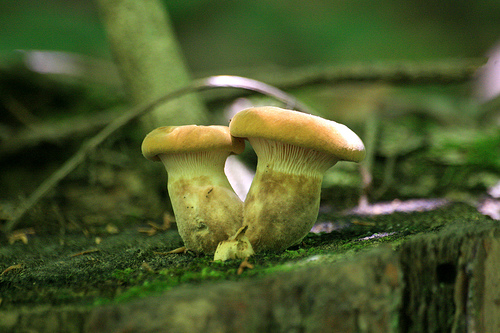
Unidentified mushrooms through filtered light on the forest floor.
(*photo credit)
September 25, 2024 Reflecting on Perichoresis and Relationships
May they all be one. Father, may they all be one in us, as you are in me and I am in you,
so that the world may believe that it was you who sent me. (John 17:21)
God's power and majesty are shown in the world of creatures; God's divine harmony is visible in the intra- and interactions of those who work either as individuals or as groups for the common good. Our communal unity and sense of interdependence for community success impels us to turn again to God in whose image we are created -- not just as individual but also as community images of God. The Persons of the Trinity as understood by St. John Damascene inhere in each Other and draw life from each Other.
The divine persons exhibit perichoresis (from the Greek word to dance) or a mutual interdependence (John 17:21). This term was perhaps first used in a Christological sense by Gregory Nazianzen to stress the mutual interdependence of the two natures in Christ. Furthermore, the image of "the divine dance" has a preferable active sense ...[T]he dancers (and the observers) experience one fluid motion of encircling, encompassing, permeating, enveloping, outstretching (GfU, pp. 271-2). LaCugna adds that there are neither leaders nor followers in the divine dance, only an eternal movement of reciprocal giving and receiving, giving again and receiving again.
Many people sincerely pray to God every day. I have observed this in and beyond Christian communities, especially when performing an environmental assessment for a Moslem center; Moslems are deeply sincere and have a relationship with God. One of the common dimensions among many Christian groups is having a personal relationship with Jesus; many pray and talk to Jesus in very familiar ways and find great comfort and vitality in doing so. Many also pray to the Holy Spirit for direct guidance in important moments of life. Some Christians such as Ignatius of Loyola (see August 19) have a personal relationship with the Trinity that enters into the willingness to see God in all things and to act in a Trinitarian manner. The emphasis in all these efforts is on personal relationships that may mean one-to-one, or one-in-community with the Lord.
We seek to find the Triune God in the divine harmonious activities of revitalizing, inviting, beckoning, and nourishing us. Ours is not a search for a static luminescence or an awesome distant divine seat of power; rather, we discover Godself revealing and sharing with us here and now. God's own harmony and ours vibrate together. By daring to approach awesome Mystery, we discover the flood of divine hospitality and familiarity. Our Trinitarian life is interrelated with that of our Triune God who is related to us though Christ and in the power of the Spirit. We are part of the Divine Family and learn in time to act godlier.
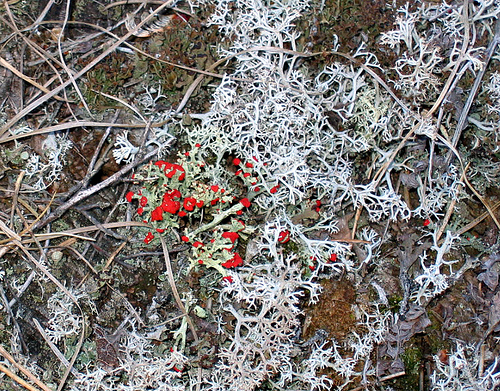
Cladonia cristatella, British soldier lichen.
(*photo credit)
September 26, 2024 Discovering Community as Trinitarian
I have come to bring fire to the Earth, and how I wish it were blazing already! (Luke 12:49)
The fire of Christ's zeal extends into all believers' goals and motivation. We learn to share common goals with the loving Lord when acting godly; we have unique gifts and personalities, both as individuals and as groups. Individually, we have certain recognized inalienable rights (of assembly, speech worship, etc.); we will be judged individually on how we used our talents and freedom. Juxtaposed to this is another consideration, of Christians as believers, who are a community seeking to work out their salvation together with a social sense of mutual responsibility.
Both views are equally valid: we are truly persons-in-the-Lord individually and in sharing common goals with others in the Body of Christ. A modern culture of excessive individualism may blind us from seeing that collaboration is a way to be "more a person," because we enhance the community's unity through our loving participation. This "more a person" comes from our incorporation into the Divine Family, inspiring us to share ever more deeply the godly nature we seek to imitate.
Because a multiplicity of communities exist, some people criticize others of us as not being good "community" people. For those who are committed to a life of stability (families, monks, or small-town business and service personnel), community life may be more locally focused than it is for those of a life of mobility. To be "catholic" means favoring broader communities while not overlooking local ones. A desire to witness to stability amid our inherent restlessness can lead some to retreat to smaller community units (or to escape to allurements). The divine movement within us (the source of our restlessness) directs us to community-with-God and that is expressed in our actions at some level of community enhancement. A few are inspired to bind divergent communities and are needed agents of change in a globalizing world.
Growing communally does not mean we lose our individuality. In fact, the more we are involved in authentic community, the more we see the need to offer our unique gifts and talents for assisting others because of urgent tasks to be performed. Truly, the whole is greater than the sum of its parts, and so the consecrated WE has a reality that goes beyond the striving of individuals working singly, in pairs, or in small groups. But the greater worth of the community enterprise as such, which surpasses the sum of individual members, does not negate the uniqueness or importance of the individual who may act in a most loving fashion. Rather, ideally the community's good should attract the individual to a more intense and loving participation. A movement for greater good through loving compassion (while tolerating fellow participants' foibles) invites us to play a greater role in bringing about God's kingdom.
We are called to be HERE and NOW, a grand place and time in salvation history. The more we realize the immensity of the call to the WE, the more we are impelled to shout an enthusiastic "yes." Mary, in seeing her share in the incarnational event, says a "yes" that resounded through the ages. And yet even her (and our) uttering of the affirmative is God's gift; learning what it means is a double blessed gift par excellence. The community's affirmation gives us further insight in being empowered by the Resurrected Lord (see May 21). And this enhances our unique individuality while improving community development. This affirms Christ's words that there are many rooms in my Father's house (John 14:2) and Paul speaking of many gifts but one Spirit (I Cor. 12:4).
The Incarnate Word becomes one of us, lives among us, suffers, dies, rises and ascends; he teaches us to be human. The Spirit sanctifies us and helps us spread the Good News to others. We profess these truths in our common recitation of the Creed. Just as scientific discoveries lead to practical applications, so our professed words can be transformed into beneficial deeds. Which comes first? Do we know and then act, or do we return to knowing after imperfect action? Knowing and doing work cyclically? Saying this, we recall the ancient Greeks were strong on speculative knowledge -- and that still has its influence within the Church. While proclaiming Good News (an application) we see the need for more knowledge, and so we return through prayer and study to sources. Through knowledge, we perfect our actions and by acting more properly we come to deeper understanding.
Mystery envelops us in an atmosphere of God's love, out of which we move as participants in the Divine Family. To be effective in our mission, our communication must imitate the self-communication of God to us through the Son and in the Holy Spirit. We profess truths of our faith through our deeds. Far from being perfected by knowing and loving God by knowing and loving our person -- Augustine's supposed position (GfU, p. 98), we know our world and in addressing its needs we enter more deeply into salvation history. Thus, we extend God's love by improving our beneficial deeds. Love generates a greater thrust to know, and knowing a greater impulse to share and love all the more. Our need to know and so extend our deeds is a restlessness; our willingness to improve is a step towards deepening our Trinitarian life, namely, we proceed from more pronounced word to more penetrating and loving deed.
We enliven communities as part of our Trinitarian life by giving ourselves wholeheartedly; we work together to overcome blemishes that harm our communities of faith; through harmonious action we extend a loving hand to accomplish beneficial results. Communities grow through harmonious relationships and this tells us much about the interior life of these communities, some of which is manifested by the expression "see how they love one another." Through harmony we imitate our Triune God.
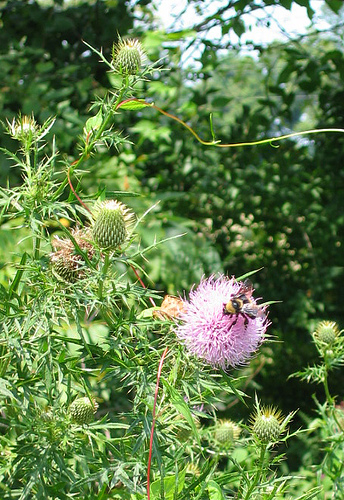
Late summer bee finds thistle in full bloom.
(*photo credit)
September 27, 2024 Praying that Community Actions Be Great Works
Pause a while and know that I am God, exalted among the nations, exalted over Earth!
(Psalm 46:10)
Our reflections contain a concluding prayer, but that is not meant to be enough. Our entire Earthhealing activity must be a prayer in itself, and this demands our continuing conversation with the Lord. Certainly, we need to pray for the success of our mission. This can be done privately in the recesses of our home, on a small group setting, or in a more formal gathering of the people of God in a special worship space. Here the Prayer of the Church throughout the world gives a sense of unity in formal settings with others (e.g., a Liturgy, prayer service or choir).
Praying together symbolizes the power of working together. We can't expect God to work miracles in which we are mere observers. The work is a miracle of faith, but it involves our participation. We can agree with Albert Einstein that everything is a miracle. Great works we do include a miracle of faith and dedication.
Believing in miracle working is more than wishful dreams; we are called to help bring about miracles of grace through our own faith. But this is not a faith that says "good bye" and "good luck." Instead, we are asked to work as faithful people fully confident that a hopeful horizon lies ahead. We need faith enough to move the mountains of our own disbelief and the despair of many that collective action will never succeed. Hard work enters into our trust that success will ultimately occur. We expect entrenched self-interests, a prevailing philosophy of status quo seekers of the current outdated economic System.
Here is where and when we jointly turn to God to calm the storms at sea; we occupy a small communal lifeboat called Earth, but must remain confident that we can survive and work together. The despair of some can be overcome by the hope of believers, who are empowered by the risen Lord. But we need prayer together -- the Prayer of the Church. Some say these prayers in community or choir and others privately, but in communion with all throughout the world. In this joined prayer, God's presence becomes more apparent to us. Communal prayer is an integral part of our whole life, a growth in maturity and proximity to God through godly work. It is the basic communal action from which all others follow.
Believers bring a needed positive attitude cultivated through communal prayer. This harkens back to enthusiasm as the criterion not just for individual initiative, but for communities as well. Maintaining that communal enthusiasm is always a challenge, but it takes both prayer as well as collaborative work. The main ingredients include authentic communal prayer, which must spring from humble hearts and those of a worshiping community.
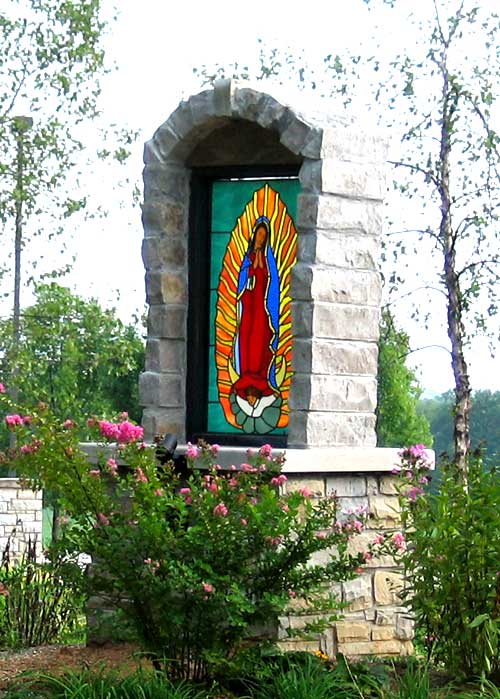
Our Lady of Guadalupe, Good Shepherd Catholic Church, Frankfort, KY.
(*photo credit)
September 28, 2024 Collaborating within and among Churches
The Church is an instrument assisting Earthhealers and can bring this about in a number of ways:
Affording a model in environmental action -- Church institutions and agencies may practice what is preached by respecting God's gifts of limited resources through restraining from purchase, by recycling and reusing, and through energy efficient vehicles and building heating, cooling, and lighting.
Acting as educational source -- The Church can sponsor services, publications, and Internet outlets and programs to teach a conservationist ethic based on a proper understanding of moral demands in care for Earth. Greed and waste are challenged and selfless care and proper respect are proclaimed.
Encouraging institution -- The Church gives encouragement through services, prayers, sacraments, and all liturgical functions in such a way that believers are inspired and discover the ever deepening mystery of God in their own lives. When people hear only terrifying news of environmental destruction they may become depressed and thus need the Church's consoling word.
Inspiring the disabled -- Many people cannot take an active role in saving Earth, but can offer their prayers and sufferings for the good of all. The Church encourages those who are unable to become more physically involved, to play a vital role in the entire mystery of salvation through their whole-hearted offering of their sufferings for the good of the whole enterprise or local programs.
Networking -- The universality of the Church can work towards Earthhealing in a very special way, for surplus resources can be shared by those who lack the basics of life. We find that often the overlooked places have dynamic church structures where people can voice their concerns away from more oppressive governmental agencies or private self-centered groups. Church structures can become first alert systems as well as means of feedback as to how well policies are being implemented at the local level.
Daring to confront the economic system -- Church leaders must forthrightly show the weaknesses of the current economic System and call for a new approach that is more equal and fair. This should include both minimum and maximum income and levels of wealth.
Practicing subsidiarity -- The principle calls for the lowest level of a hierarchical structure to make decisions to the broadest degree possible in areas of local governing decisions. Each level has space for such governance to the optimal degree possible. Encouraging local self-governance is part of the total Church's mission to help maximize Earthhealing at the grassroots level.
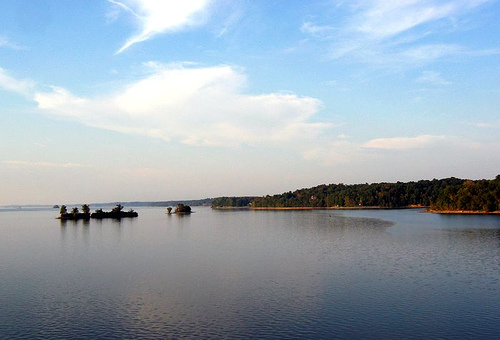
Skies over Lake Barkley, KY.
(*photo credit)
September 29, 2024 Dedicating Ourselves Totally to God
You rich, weep and wail over your impending miseries. (James 5:1)
Sometimes we hear some challenging readings in the Scriptures (Numbers 11: 25-29) Would that all the people of the Lord were prophets! and (Mark 9, 38-43, 45, 47-48) If your hand is your difficulty, cut it off! Today's are some hard sayings. In the Book of Numbers we see that God's gifts are generously bestowed on those whom others may overlook, and Moses had the openness to see this. If we are just as open, we will see God's gifts going to many we tend to overlook, unless we open our eyes to the poor.
St. James closes his letter with powerful words on the responsibilities of material gifts. He speaks with immense clarity on wealth and its misuse in our world. It may be said that wealth in James' day was different from wealth now, but was it? Wealth is having concentrated possessions in contrast to that of our neighbor. Actually today, as in times past, excessive wealth must be exposed, controlled, and redistributed, because it has a corrosive effect on our democratic system, vesting power in those with more goods. We, as voting and responsible citizens, permit some people to become financially powerful; their economic power soon overshadows and influences political policy, and the wealthy overwhelm the once democratic system by their economic power.
Affluence makes people insensitive to the needs of others. St. James spoke about it at length. Wealth gives a bad example. Others in the world have until recently wanted to imitate us in the Americanization of the globe. Only since 9-11 has this changed. In an effort to fight terrorism and defend our privileges, America can be unpopular in parts of the world. Much of this unpopularity comes from an elitist attitude that needs review. We need to follow St. Francis, who used his spirit, cheerfulness, insight, presence in the Lord, and sense of gratitude to help others come to God by gentle ways. He moved people to aspire to heaven rather to fear hell. It is love of God, not an imperfect contrition that motivates the best. But Francis did more; he gave up the allurements of the world as embodied in his family, wealthy merchants of fine cloth. He showed that simplicity was the better example, not -- Would that I be a millionaire to give to the poor; rather -- Would that I could give love to the poor, not wealth.
Let's ask once more: How do we radically come to God, not by giving from our excessive wealth or severe penances, but by full dedication shown by love and mercy? We must change our lives if we are to remain dedicated to God in a world where the culture is predominantly materialistic and the pressure immense to conform to the System. The divine invitation is to conversion, radical change of heart, rededication to God, and spiritual revolution.

Late summer hike, Cumberland Gap National Historical Park.
(*photo credit)
September 30, 2024 Recognizing Various Spirits at Work
It is not every spirit, my dear people, that you can trust; test them to see if they come from God; there are many false prophets, now, in the world. (I John 4:1)
On August 29th we reflected on personal spiritual discernment being now extended to a communal one, with to some degree of similarity. However, communal mean having input on the part of team members and not just of isolated individuals. Discernment involves working through the Holy Spirit to discover the various influences (good or bad) that pull someone together or apart. Self-centeredness and other agendas can be the work of the Evil One and thus be avoided. Also spiritual discernment involves openness to the Good Spirit, willingness to consider all possible options in a prayerful manner, acceptance of assistance from others who are also anxious for the proper decision, and indifference to an uncertain outcome to which the group welcomes the free Spirit working in our lives.
St. Paul in speaking of gifts within a community talks about the gift of recognizing spirits (I Corinthians 12:10), namely, the ability to discern good from bad spirits that are listed here:
* Negativity -- Communities can be paralyzed by utter disparagement on the part of certain members who doubt that there will be a successful outcome. An excessively critical attitude has a way of paralyzing a community if allowed to hold sway. This form of control emphasizes the doubts about whether positive steps can be taken and leaves the community drained of enthusiasm and unable to raise itself (without God's help). Members may fail to speak in fear of being criticized; paralysis becomes contagious.
* Self-interest -- Communities can be infiltrated by those seeking to gain their own self-interests at the expense of the group. When this emerges, others pull back and don't give their full self, thus stifling enthusiasm of more positive members. People withdraw to protect the base and are no longer open, for fear that materials will be snatched by self-interested parties.
* Inadequacy -- Communities are never sure of their success and thus hold back until more and more changes are made or resources are gathered. This procrastination is another form of paralysis and requires good leadership from within to break the logjam. The situation may stem from insecurity or false humility.
* Dishonesty and internal friction -- Some may shirk and allow others to bear the work burden alone. Communities can fight.
The good Spirit may encourage a holy restlessness: HERE is not totally secure; NOW includes urgent matters to be addressed; and WE are people called to overcome imperfections and move to greater unity. We perceive this restlessness as our quest for God, both as individuals and as worshiping communities.


